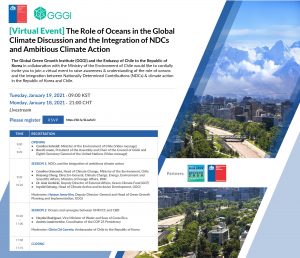DATE AND TIME:
09:00 a.m. – 11:20 a.m. KST / Tuesday, January 19, 2021
09:00 p.m. – 11:20 p.m. CHT / Monday, January 18, 2021
Virtual Event
ORGANIZERS:
Embassy of Chile to the Republic of Korea
Global Green Growth Institute
PARTNERS:
Ministry of the Environment of Chile
BACKGROUND:
The 21st Conference of the Parties (COP21) to the United Nations Framework Convention on Climate Change (UNFCCC), held in Paris in 2015, was a historic moment, as it adopted a binding universal agreement to undertake ambitious efforts to combat climate change and adapt to its effects, establishing as a central objective the limitation of the average increase in the planet’s temperature to 1.5 degrees Celsius with respect to pre-industrial levels, as a measure against climate change.
Chile, as Presidency of the UNFCCC COP25, has sought to contribute to this global effort, leading the negotiations at the COP25 in Madrid, and presenting some specific issues to be considered in the negotiations and the NDCs.
In order to raise the level of global ambition, in April 2020, the Government of Chile officially delivered the update of its National Determined Contribution (NDC) to the United Nations Framework Convention on Climate Change (UNFCCC), becoming the first Latin American country and one of the first countries in the world to do so.
In this way, it seeks to strengthen the synergy between Chile’s global climate commitments and the national agenda, clearly demonstrating the close link between the economic, social and environmental dimensions of the Paris Agreement and the Agenda 2030 of the Sustainable Development Goals, established by the UN.
The updating of the NDC came about after a broad and cross-cutting participatory process in which civil society, the scientific community, and the public and private worlds were included. It received 1,573 observations, many of which were included in the final draft.
The document contains commitments to reduce their greenhouse gas (GHG) emissions by 2030 and to address the impacts of climate change. It also considers variables such as water security, gender equity and equality, and includes – for the first time – the social pillar of just transition, protecting the rights of the most vulnerable in the process of decarbonizing the energy matrix.
Likewise, the role of the ocean, the circular economy, forests, wetlands, including peatlands, and ecosystems and their functions and services have been incorporated into the NDCs as elements that contribute, in an integrated manner, to addressing both the causes and the effects and impacts of climate change. Today, 42% of our exclusive economic zone and 21% of our continental territory are under official environmental protection.
This comprehensive vision is complemented by the conservation of biodiversity, through the process of developing the post-2020 framework of the CBD and a call to increase the targets for this purpose and their effective implementation, as well as the implementation of nature-based solutions as tools to deal with the effects of climate change.
In this context, Chile is actively participating in the post 2020 framework process and has joined important global alliances and coalitions that aim to boost and promote increased ambition around conservation and restoration, such as the High Ambition Coalition for Nature and People, Blue leaders, Global Ocean Alliance, which promotes the scientific evidence of the need to protect at least 30% of the planet over the next decade.
OBJECTIVES:
- To share the experience and good practices developed by the Government of Chile, as Presidency of the COP25, to contribute to the global effort to face climate change, through the negotiations at COP25 in Madrid, and to raise the level of ambition in its national climate commitments.
- To transmit the experience in the process of elaboration of the NDCs, and the environmental policies defined there, with the aim of reducing emissions in absolute terms by 2030, with a peak in 2025, and assuming these goals as medium-term objectives toward carbon neutrality by 2050.
- To present the new and more ambitious commitments of Chile, in terms of mitigation, adaptation, which includes new components such as the ocean, the circular economy with an integrated scientific approach, marine protected areas, and biodiversity, among others.
- To disseminate the experience of other Latin American countries in combating climate change and their national and global commitments.
PARTICIPANTS:
- Carolina Schmidt, Minister of the Environment of Chile (Video Message)
- Ban Ki-moon, President of the Assembly and Chair of the Council of GGGI and Eighth Secretary General of the United Nations (Video message)
- Carolina Urmeneta, Head of Climate Change Ministry of Environment of Chile
-
Keeyong Chung, Director-General, Climate Change, Energy, Environment and Scientific Affairs, Ministry of Foreign Affairs
- Gloria Cid Carreño, Ambassador of Chile to the Republic of Korea (Moderator)
- Hyoeun Jenny Kim, Deputy Director-General and Head of Green Growth Planning and Implementation, GGGI (Moderator)
- Dr. Ania Grobicki, Deputy Director of External Affairs, Green Climate Fund (GCF)
- Ingvild Solvang, Head of Climate Action and Inclusive Development, GGGI
- Andrés Landerretche, Coordinator of the COP 25 Presidency
- Haydee Rodriguez, Vice Minister of Water and Seas of Costa Rica
